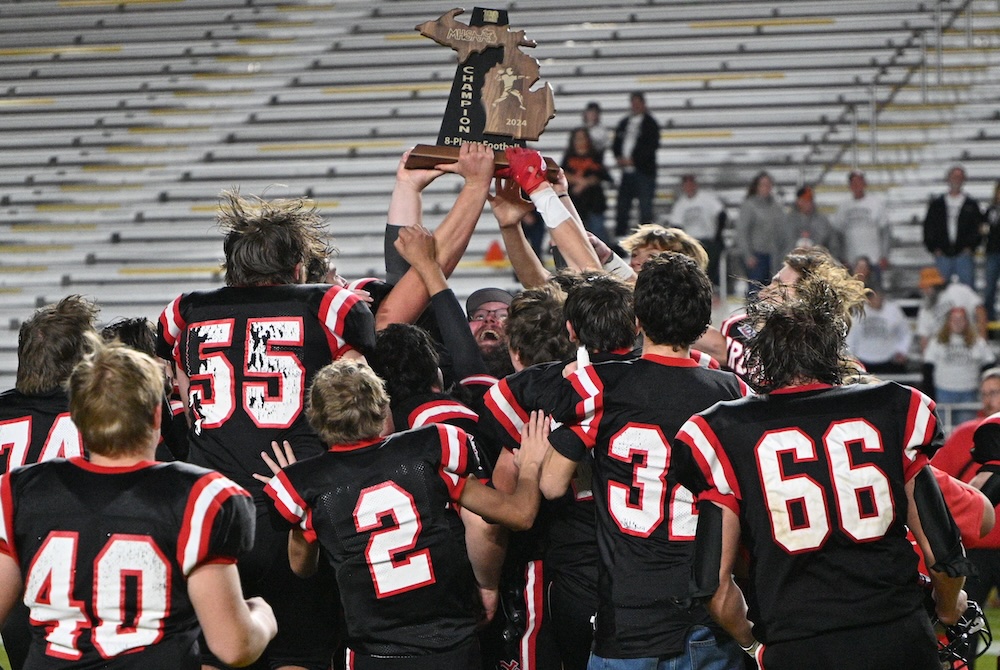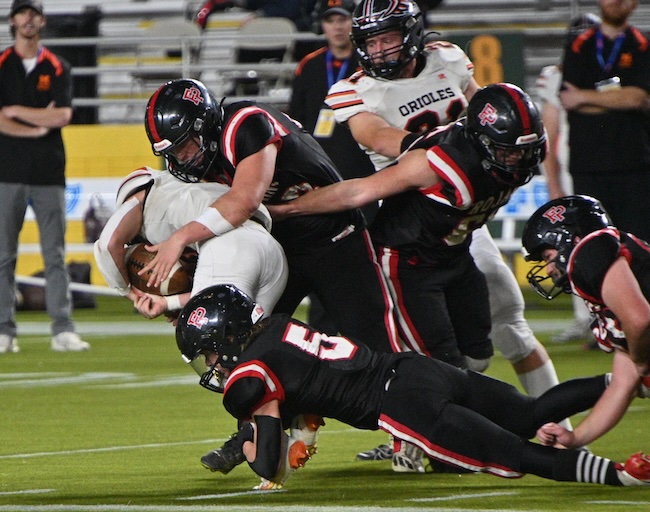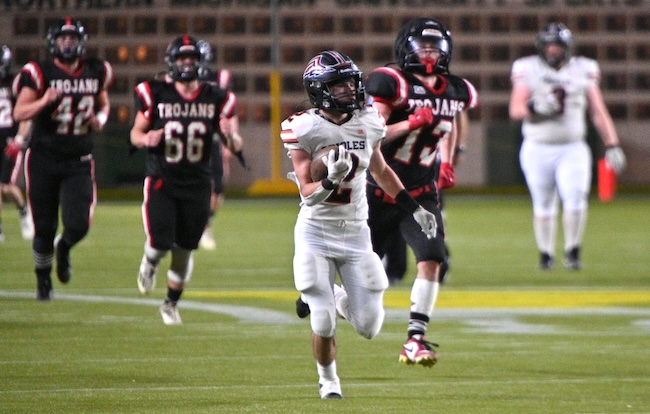
Writer-Turned-Coach Enjoys Debut
November 3, 2016
By Dennis Grall
Special for Second Half
ESCANABA — Sam Eggleston has seen high school football from two drastically different viewpoints. Now, even though he is an unpaid volunteer, he enjoys being on the sideline as a coach.
 Eggleston just completed his first season as a high school head coach, with Eben Superior Central winning its final three games to finish 4-5 in 8-player football. The Cougars were among the first teams in the state to join the 8-player format in 2010, their first year of football.
Eggleston just completed his first season as a high school head coach, with Eben Superior Central winning its final three games to finish 4-5 in 8-player football. The Cougars were among the first teams in the state to join the 8-player format in 2010, their first year of football.
Eggleston was a sportswriter before becoming a coach, giving him different perspectives to watching the same event.
The 1998 Rock Mid Peninsula High School graduate worked at newspapers in Escanaba, Kenai, Alaska; Northville and Novi, and Marquette before becoming a freelance writer and website blog editor in 2008. He started the writing phase of his career in 2000 with the Daily Press in Escanaba, under my direction.
He served as a volunteer assistant football coach in Northville, then moved back to the Upper Peninsula and became a volunteer coach at his alma mater in 2011 when the Wolverines went to 8-player football. He joined Superior Central in 2014 and spent two seasons as a volunteer aide until landing the head job just two weeks before the 2016 preseason began.
“In both careers … you took a shot on me and I ran with it, and the same with coaching; they gave me a shot and I’ve run with it as best I can,” he said.
In addition to his unpaid position at Superior Central, in rural Alger County, Eggleston is responsible for fundraising for the self-funded football program, a major priority for his offseason.
“My coaching is over (for the season) now and the majority of my time will be spent on raising funds so we can get new helmets, get new pads to replace ones that are broke, spending money we don’t have so we’ve got to make that up now,” he said. “We have to win now to have successful fundraisers.”
As a sportswriter, Eggleston would simply switch gears and move on to coverage of the next athletic season, for instance once fall sports moved into winter. He also never had to worry about how coaches managed off-field X’s and O’s once their seasons concluded.
Life was totally different as a reporter. “I had a different approach, different viewpoint, different mindset to a game as a writer,” said Eggleston, who still has the heft of when he was a lineman but now looks like a lumberjack with his bushy beard and build.
“Now I have to worry about every kid and every position,” he said. “Sometimes I don’t even see the end result of the play because I’m watching the line play. I don’t even know how well my running back did until I see where they moved the stick.”
He may also be working on an injured player while the game goes on, trying to make play calls and other decisions at the same time.
As a sportswriter, he would be jotting down notes between plays or perhaps checking the result of a picture he took of the previous snap, totally unaware the coach was monitoring several assignments.
“I look back at the writer I was and as a coach now, and I would hate the type of writer I was,” he said.
Eggleston would analyze why a coach would switch to running a sweep rather than the counter that had been working, all while the coach may be working on an injured player that caused a change in offensive plans.
“As a writer I never had the insight to see everything. I just saw the overall game and kept track of every yard,” he said. “As a coach I can’t even tell if the play went five yards because I have three plays stacked up as the game goes on.”
While he was writing sports in the metro Detroit area, his weekly paper often covered games also being covered by the Detroit Free Press or the Oakland Press, with those stories appearing the next day. Eggleston’s story would appear maybe five days later, after everyone knew what happened.
 “I had to come in with a different angle. I tried to be a little more analytical and focus on strategy versus the flourish and try to get the meat of the game rather than get to the flowery parts,” he recalled. “I tried to take a different approach and make my stuff more interesting.”
“I had to come in with a different angle. I tried to be a little more analytical and focus on strategy versus the flourish and try to get the meat of the game rather than get to the flowery parts,” he recalled. “I tried to take a different approach and make my stuff more interesting.”
His style apparently worked as the paper received several journalism awards and subscriptions remained strong.
Writing also provided some interesting backdrops. He had to use small charter planes to see some games in Alaska, or get to Nome to handle features about the Iditarod sled dog race.
He recalls covering a high school hockey game on an outdoor rink in Alaska and said “it was the first time I saw wind shear affect a hockey game.”
Eggleston also covered a football game where a kicker booted the ball off the uprights, then off a fence, and it bounced into the ocean in Homer.
He reported on a murder trial at that paper, where he would work the news desk in the morning, take time off and then handle sports at night. “It was super stressful,” he said.
Now walking the sidelines as a coach, he said “it definitely does feel like I’ve seen both sides of the coin, and I understand both sides of them better.”
He remembers just giving “little more rounded answers and (to) give both sides of the story” in postgame interviews. “A lot of coaches give canned answers. I try to be a little more in-depth and help try to write the story.”
In his early days as a sportswriter, he said “I would see the game unfold and see the pressures and why a coach would make a decision to go for it (on fourth down). I was a bit more critical of the coach and their decision,” he said, adding “I would probably have been a little more biting about it when I wrote the story.”
He admits in those days “I thought I knew everything there was to know about football. I played it,” he said. “I always approached the game like I was the professional and knew everything about the game. Now as a coach there are a host of responsibilities during every game. I am in completely different waters now. The hardest thing is keeping the kids pointed in the right direction as things go wrong.
“You’ve got the entire team and you’ve got to keep moving in a positive direction, keep the focus going forward. Forget the last play and work on the next one and get the kids to buy into that philosophy.”
He also compares his first writing assignment at the Daily Press with his first game this season at Ontonagon. “I did a (men’s baseball) story about the Escanaba Polecats, and you read my first line and said, ‘Did Yoda write this?’ I thought, oh my God, I don’t know what I’m doing.”
The Cougars lost their opener this fall 36-8, and Eggleston said “after being an assistant for four years, I still wasn’t prepared going into that Ontonagon game. We lost, and as I look back, if we played them right now I think we would beat them.
“I had no clue coming into that first game and didn’t have any idea how to get us back on track.”
He eventually figured enough out to finish 4-5 and found plenty of ways to enjoy being a coach.
Eggleston tries to eat lunch with his players every day, and he pays for his own meal.
“I want a family environment there; we all sit at the same table,” he said. “What I get back is relationships I never had before. I feel like I have 21 kids, and I love every minute of it.”
 Denny Grall retired in 2012 after 39 years at the Escanaba Daily Press and four at the Green Bay Press-Gazette, plus 15 months for WLST radio in Escanaba; he served as the Daily Press sports editor from 1970-80 and again from 1984-2012. Grall was inducted into the Upper Peninsula Sports Hall of Fame in 2002 and serves as its executive secretary. E-mail him at [email protected] with story ideas for the Upper Peninsula.
Denny Grall retired in 2012 after 39 years at the Escanaba Daily Press and four at the Green Bay Press-Gazette, plus 15 months for WLST radio in Escanaba; he served as the Daily Press sports editor from 1970-80 and again from 1984-2012. Grall was inducted into the Upper Peninsula Sports Hall of Fame in 2002 and serves as its executive secretary. E-mail him at [email protected] with story ideas for the Upper Peninsula.
PHOTOS: (Top) Eben Junction Superior Central football coach Sam Eggleston speaks with some of his players during a game this season. (Middle) Eggleston monitors the action on the field. (Photos by Dennis Grall.)

'Mighty' Forest Park Rides Overpowering Start to 5th Finals Championship
By
Jason Juno
Special for MHSAA.com
November 23, 2024
MARQUETTE — The Crystal Falls Forest Park tradition continues.
The Trojans won their fifth MHSAA Finals championship in their 15th title game appearance 42-20 over Morrice on Saturday in the 8-player Division 2 contest at the Superior Dome.
Forest Park (12-1) took advantage of two Morrice fumbles to take a 28-0 lead into halftime. The Orioles came alive in the second half, but they couldn’t overcome such a start.
It was the second 8-player title for Forest Park with the first coming in 2017, and the first for coach Brian Fabbri, who started as a lineman in two 11-player championship games (2004 and 2005) for the Trojans.
He was thrilled to help keep the tradition alive.
“I absolutely love it,” Fabbri said. “I’m blessed to be able to have my name up there with the Mettlachs, Santillis, Graffs. It’s unbelievable.”
Dick Mettlach led Forest Park to back-to-back titles in 1975 and 1976. Bill Santilli took Forest Park to seven title games and won the 2007 championship. Dave Graff was the head coach of the 2017 champion.
“We’re the fifth one to win it; it just feels awesome,” said Forest Park senior Kevin Giuliani, who at 6-foot-5 and 270 pounds was named the Upper Peninsula’s top lineman by media vote recently.
Forest Park’s first-half dominance proved to be the difference in this championship clincher.
 The Trojans got the ball first and capped an 11-play, 53-yard drive with a four-yard touchdown run by senior Grayson Sundell midway through the first quarter.
The Trojans got the ball first and capped an 11-play, 53-yard drive with a four-yard touchdown run by senior Grayson Sundell midway through the first quarter.
Forest Park’s Noah Starr recovered an onside kick on the ensuing kickoff, but Morrice came up with a big stop on fourth down in the red zone.
Any momentum from that evaporated quickly. The Orioles went three-and-out in their first offensive possession of the game, and Forest Park doubled its lead on the first play after getting the ball back. Sophomore running back Dax Huuki went 58 yards for a touchdown and Dietrich Rasner, who made all six extra points he tried in the game, made it 14-0 two minutes into the second quarter.
Morrice started its next possession with good field position at midfield but fumbled on the second play, and Nik Stephens recovered it at the Forest Park 45. It took the Trojans eight plays to score, and it was Stephens with the eight-yard run to paydirt for a 21-0 advantage.
The Orioles coughed it up again, this time on the third play of their next possession, with Vic Giuliani recovering it.
Huuki scored his second touchdown of the day, a four-yard rush with 10 seconds left in the half. It was another methodical drive of eight plays to go 50 yards. Forest Park led 28-0 at the half.
“Getting that quick score before half was huge for us,” Fabbri said.
The Trojans ended the half with 184 rushing yards on 33 carries. Morrice had only 11 offensive plays the whole half, thanks in part to their turnovers.
That changed during the second half – just not enough to put the game in any serious doubt.
Morrice (11-2) picked up its first first down during the first possession of the second half, and got its first big play, a 32-yard run by Joel Fisher that set the Orioles up at the Forest Park 5. Two plays later, he ran in a score and the lead was down to 28-6. Fisher led Morrice with 99 yards rushing on 12 carries.
The Trojans added a third-quarter touchdown of their own as Stephens ran five yards for a score on the ensuing possession to make it 35-6. Morrice’s Wyatt Cartier ran one yard for a touchdown in the early stages of the fourth quarter, and Fisher returned a punt 85 yards for a TD with 5:30 left in the game, making it 35-20.
 “I knew they were a good team. We knew it was coming,” Fabbri said. “It was only a matter of time, and it happened. We had enough cushion there. We made enough big plays at the end.”
“I knew they were a good team. We knew it was coming,” Fabbri said. “It was only a matter of time, and it happened. We had enough cushion there. We made enough big plays at the end.”
The last came a minute later, when Forest Park scored on a 49-yard rush by Stephens, his third touchdown of the day — half of his carries went for scores — and the Trojans were celebrating a championship soon after.
Morrice coach Kendall Crockett said he was proud of his team for fighting the entire game. The Orioles obviously competed much better during the second half as they accumulated 155 of their 194 total yards.
“We hung onto the ball, first of all. That was kind of a big deal for us,” he said. “... As physical as they were in that first half, I thought that we really fought back in the second half, didn’t quit and kept playing ball.”
That physical play has been a staple of Forest Park football since their first state title. Forest Park ran for 184 yards in the first half and finished with 291 on 47 carries — Huuki led with 136 yards on 19 carries. Fullback Trent Kannich ran for fewer yards, 68, but he was a factor as well as Crockett pointed out how hard he hit.
“(Huuki’s) a sophomore, but he runs like a senior,” Fabbri said. “He’s battle-tested. He stepped up when he had to and made some plays.”
Huuki said Morrice was a physical team as well, but Forest Park was determined to go home with a win.
“That was just put into our head going into this week — the most physical team with the most grit, and the mightiest team’s going to win,” he said. “So we just came in wanting it all.”
The Trojans did it in front of a huge sea of Forest Park fans, who chanted, “U.P. Power!” when it became certain the Trojans were going to win late in the fourth quarter.
“It doesn’t seem real,” Kevin Giuliani said. “I’m just so happy. Words can’t explain what I feel like right now. I feel like I’m on top of the world right now.”
PHOTOS (Top) Crystal Falls Forest Park players swarm coach Brian Fabbri (holding trophy) in celebration Saturday at the Superior Dome. (Middle) Forest Park’s Kevin Giuliani and Brody Starr (5) bring down an Orioles ball carrier. (Below) Morrice’s Joel Fisher (2) breaks away from the Forest Park defense for a long second-half touchdown run. (Photos by Cara Kamps. Click for more.)

